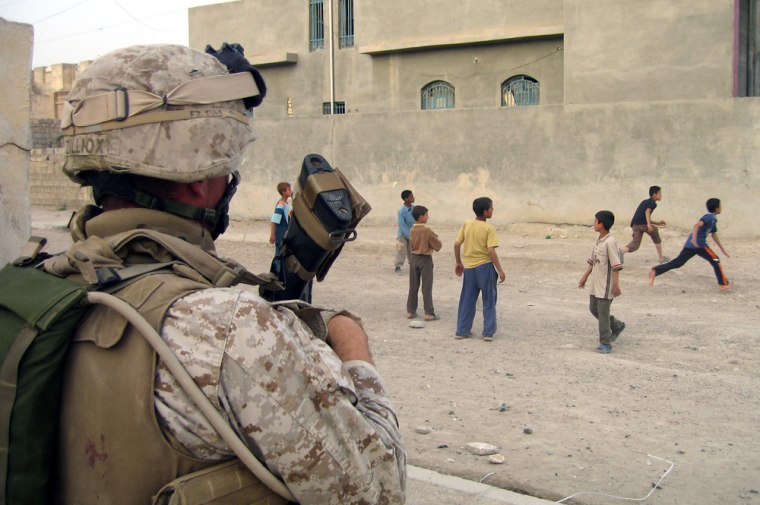The insurgency that bedeviled U.S. forces for years and killed thousands of Iraqis and Americans has withered to the point where it is "not even much of a challenge any more" to Iraq's future, Ambassador Ryan Crocker said Thursday in an interview with The Associated Press.
Crocker, a veteran Mideast envoy who plans to wind up a nearly two-year tour here in January, would not rule out that Iraq could again descend into sectarian warfare in a contest for power and resources. But he expressed optimism that ordinary Iraqis, enjoying a new calm on their streets, will not allow it.
"You talk to people (Iraqis), and they just say, `Never again. We almost destroyed ourselves,' " he said in an hour-long interview. "There is almost a kind of embarrassment over it: 'How could we Iraqis do that?' "
His characterization of the state of the insurgency was striking, given its central role in the more than 5-year war and its proven ability to adjust, regroup and recruit. Crocker did not assert that the insurgency was dead, but he came close to casting it as having surrendered the initiative and lost its appeal.
"Under current circumstances, it's not a threat and arguably not even much of a challenge any more," Crocker said. "There isn't a whole lot left of that insurgency, at least certainly in an active sense."
Crocker said the insurgency is so weakened it cannot even try to confront the government, let alone overthrow it.
"By and large, what's left of the insurgency is just trying to hang on," he said.
'Watch your back'
On a cautionary note, Crocker said the terrorist group known as al-Qaida in Iraq, while currently in decline and largely expelled from its urban redoubts, could not be ruled out as a future threat to stability.
"It could regenerate. It could come back," he said.
Crocker said it is too early to declare victory in Iraq — either by the U.S. or the Iraqi government. He stressed the importance of the Iraqis not thinking it's time to let up on the remnants of al-Qaida.
"I do worry a bit sometimes that some in the (Iraqi) government say, `We've won this. It's over. Now we go on to other things.' Well, you've got to go on to other things, but watch your back," he said.
Crocker, who was ambassador to Pakistan before coming to Baghdad in March 2007 and also served in Syria, Kuwait and Lebanon, is widely credited with creating an unusually effective partnership with Gen. David Petraeus, the top U.S. commander in Iraq, who is due to leave his post in September.
Together they applied pressure on Prime Minister Nouri al-Maliki and his Shiite-dominated government to confront extremist groups — both Sunni and Shiite, and to move toward political reconciliation. Among the recent results were successful campaigns to establish relative calm in the key cities of Basra and Mosul, as well as the predominantly Shiite section of eastern Baghdad known as Sadr City.
Violence lowest since 2004
The U.S. military's main measures of violence in Iraq now stand at their lowest point since early 2004, when the Sunni insurgency was developing but had not yet exploded into mass violence.
In the interview in his office at the U.S. Embassy overlooking the Tigris, Crocker was mostly upbeat about keeping up the progress.
He cited a "powerful force" of popular sentiment in Iraq that has underpinned the decline in violence. He was referring to Iraqis' rejection of extremists on both the Sunni and the Shiite side — a development that has given U.S. officials hope that the insurgents may no longer have a foundation from which to fight.
Crocker said the switch to a more tolerant Iraqi view on sectarian rivalries was a long time in coming.
"And it would probably take quite a bit to shift it back," he said.
Crocker said he sees signs that more ordinary Iraqis welcome the less violent period that is now emerging.
"One of the encouraging factors is that as violent and as vicious as that sectarian fighting was, it's kind of an anomaly here," he said. "Yes, there are sectarian differences and Saddam's government really went after the non-Sunni populations, both Kurds and Shiites, but that broadly is seen as Saddam (Hussein), not the will of the Sunni people." Historically, he said, the sects have coexisted and intermingled.
Provincial elections stalled
The ambassador also said he sees almost no chance that provincial elections scheduled for October will take place earlier than December. He described himself as cautiously optimistic that the government will work out the compromises needed to pass legislation required before the landmark elections can be held.
"The popular sentiment in favor of these elections is very, very strong," he said.
Iraq's presidential council on Wednesday rejected a draft provincial elections law and sent it back to parliament for reworking.
Crocker said he thinks the various contending political forces are in a mood to compromise, although perhaps not until the last possible moment.
"It's going to be an ongoing thrash, but we've been through this before" with other fights over important pieces of legislation, he said. "It's just a fact of Iraqi politics: it's all high wire," Crocker said.
